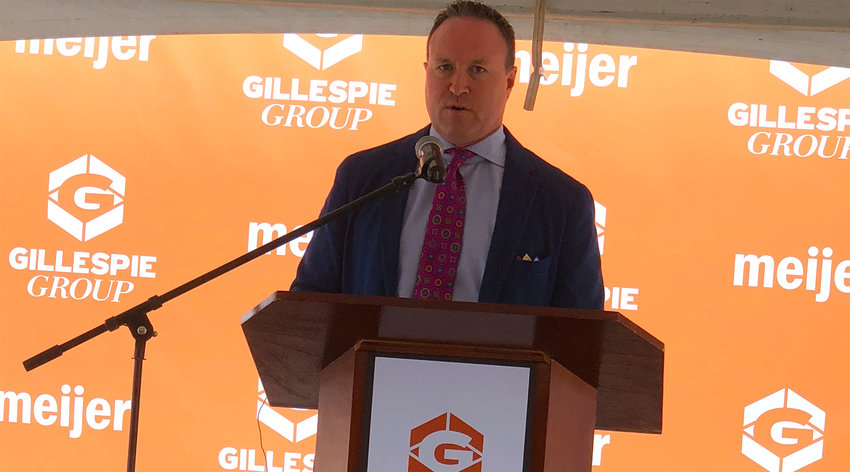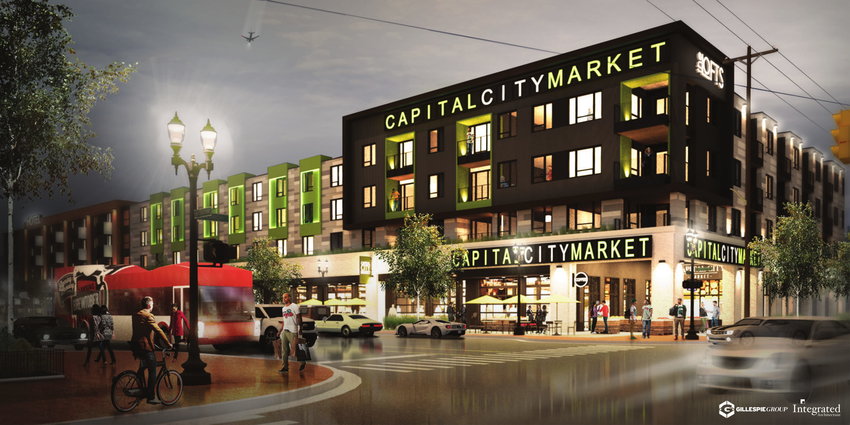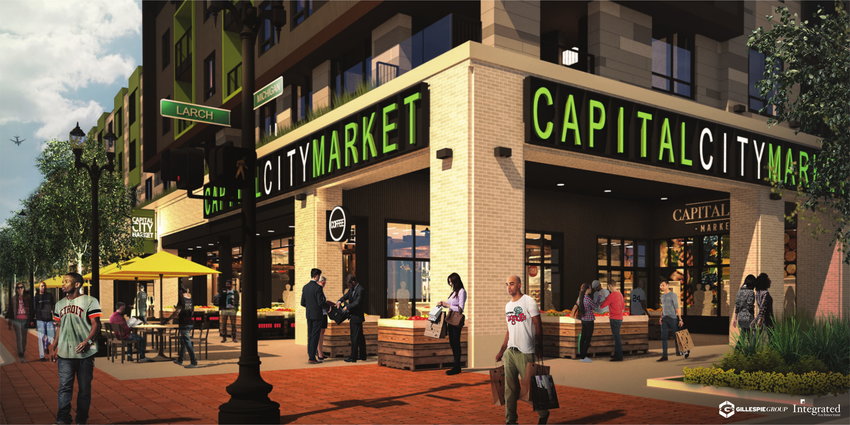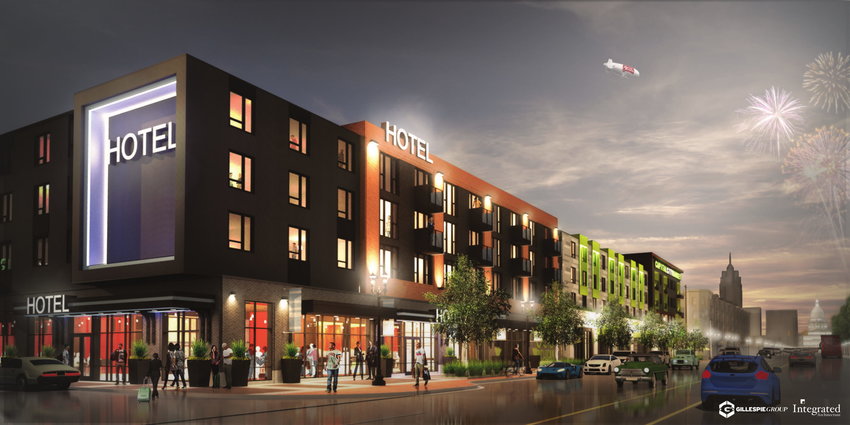
Developer Pat Gillespie at Wednesday's press conference.
WEDNESDAY, AUG. 29 — A massive development project could soon reshape Michigan Avenue.
Developer Pat Gillespie today announced plans to construct the first hotel to be built in downtown Lansing in more than 20 years. The four-story concept — set to consume 21 parcels along more than 4 acres — will also include dozens of apartments and will be anchored by a mini Meijer grocery store.
“This is a game-changer for downtown Lansing,” Gillespie said to a crowd gathered at the site of former filling station at the corner of Michigan and Larch Street.
“It will engage the pride of downtown Lansing residents and drastically change the quality of living. Downtown Lansing’s residents and the existing business community will reap the rewards of this project.”
The Gillespie Group — the “creative urban” developers behind other colossal undertakings like The Outfield, Marketplace, Prudden Place, Lansing Brewing Co. and more — for years has sought to change the face of downtown Lansing. The city’s Stadium District in particular has grown into a sort of de facto Gillespieville.
And the expansion continues.
Crowds gathered for the announcement along the 600 block of East Michigan Avenue, where the development is poised for a groundbreaking as early as next spring, with an estimated opening date pegged for late-2020.
U.S. Sen. Debbie Stabenow, D-Mich., and Lansing Mayor Andy Schor were among other politicians and community stakeholders who helped roll out the plans.
“A capital city market and grocery store has been my priority for several years, Schor said. “A new hotel is a necessity as we continue the transformation of the core of Lansing. This project is just what those in Lansing have asked for, whether they live here, work here, or are visiting our great city.”
The hotel will be developed by nationally known Concord Hospitality — the management team behind familiar names like Hyatt, Courtyard and Renaissance — and will include up to 124 guest rooms. A restaurant, bar and spaces for conferences are geared to accommodate the typical convention and tourism crowds.
Another 36 apartments will also be merged into the structure for those seeking the “downtown living experience,” with one- and two-bedroom apartments expected to be available for lease as early as 2020. What makes them unique? Tenants will be able shop at the Meijer without ever stepping outside, Gillespie said.
The grocery store — billed under the working moniker Capital City Market — would mark Meijer’s second departure from its traditional storefronts to an “urban market” concept. Gillespie said it will help clear Lansing’s reputation as a “food desert” and offer a variety of affordable, fresh and nutritious foods.
The concept for the marketplace is modeled after the Bridge Street Market that opened today in Grand Rapids. That store, so far, is the smallest to open under the Meijer brand and doesn’t carry the typical namesake like other stores operated by the Midwestern retail giant.
Gillespie’s concept, too, will be a subtle one.
“We have heard the community consistently call for a downtown grocer and additional hotel accomodations,” Gillespie added. “It’s definitely time. With the partnerships established with Meijer and Concord Hospitality, we are ready to transform another corner of the Stadium District.”
The similarly formatted mini-Meijer that opened today in Grand Rapids, at 37,000 square feet, is pegged to be the exact same size as Gillespie’s latest project. The website notes it provides a “unique shopping experience” with 22-foot ceilings, six garage-style doors that open onto the sidewalk and a built-in coffee shop.
That market too, as reported in the Grand Rapids Press, will anchor an ambitious $60 million block-long development by Meijer’s longtime contractor, Rockford Construction. The addition of the market was considered a key enhancement to the project and landed tax breaks and a low interest loan, reports state.
Gillespie emphasized his development project still requires approvals in partnership with the Michigan Department of Environmental Quality, the city of Lansing and its Brownfield Authority, the Lansing Economic Area Partnership, and the Michigan Economic Development Corp.
A “large amount” of cleanup will be needed before the project can begin. Gillespie said years of contamination from automotive repairs and other environmentally concerning practices have left the land polluted badly.
But those efforts may be relatively simple compared to the work Gillespie did to acquire the properties.
The Gillespie Group bought the initial corner plot from the Ingham County Land Bank but the project required an additional 20 parcels, none of which were listed for sale, Gillespie said. It took years to negotiate with local businesses — like the recently closed Brogan’s Tire and Auto Service — before the plans could take shape.
Gillespie labeled those property owners as the “unsung heroes” behind the plans.
"We're on the map because of all of you, because of the fact that we love this community," Stabenow added. "We're going to continue to do everything possible to grow and to flourish, and to make this the place that we want not only to raise our children and grandchildren, but we want others to come and celebrate our capital city."
Renderings released by the Gillespie Group provided a closer look at how the project could look:



More details can be found at www.gg600block.com. Visit lansingcitypulse.com for continued coverage on the project.
This story was updated at 5:11 p.m. EST.
Support City Pulse - Donate Today!
Comments
No comments on this item Please log in to comment by clicking here